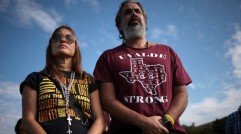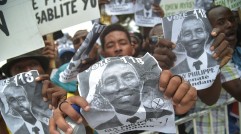Mexican Lawmaker ‘Drops Trow’ in Protest at Energy Decision: Why Disrobing Doesn’t Help Change Policies
"This is how you're stripping the nation. Where is the benefit? I'm not ashamed, what you're doing is a shame!" said Mexican MP Antonio Garcia Conejo, from the PRD (Party of the Democratic Revolution) as he dropped his trousers and removed his socks during a Senate debate last week.
On Dec. 11, Conejo was compelled to strip down to his boxers in protest of Mexico approving an energy reform bill that will allow foreign companies to invest in its oil sector after 75 years of state control over production, BBC News reported.
After a strong approval given by both houses of Congress on Thursday, President Enrique Peña Nieto, who pushed for this bill, said via his Twitter account that "It will boost productivity, economic growth and job creation."
"The new energy law allows private oil and gas companies to drill for oil and gas with the state-run firm Pemex in exchange for a share of the profits. It has been approved by the Chamber of Deputies a day after being passed by the upper house, the Senate."
"It was an act of protest. Some of it was personal frustration," Conejo told Vocativ. "I had the feeling no one was listening to me, so I had to catch the attention of the floor in some way. But otherwise, it was symbolic. The government is trying to strip the country of its resources, so I thought I might as well strip myself."
According to BBC News, "there were scuffles during the long debate in the lower house of the Mexican Congress, and Landy Berzunza of the governing PRI party was taken to hospital with a scratched retina after an altercation with opposition MP Karen Quiroga."
Members of the opposition Democratic Revolution Party (PRD) didn't hold back and were vocal in an attempt to disrupt the proceedings to prevent the passage of the bill.
"Will there be more stripteases in the future to stop it?" Vocativ asked Conejo.
"Our struggle will continue. I'm not sure if I'll do something like this again, but the most important thing is to continue creating awareness amongst Mexicans about this nefarious reform," he said.
A 'Naked' History:
Protest disrobing is nothing new, and go far back in history in the United States and abroad.
In the U.S., "one of the rarer old -- but newly reactivated -- forms of nonviolent protest is the public removal of clothes as a means of expressing one's religious disapproval or political protest. During the Quaker 'invasion' of the intolerant Massachusetts Bay Colony in the seventeenth century, Lydia Wardel entered Newbury Church naked as a protest," according to author Gene Sharp's "The Politics of Nonviolent Action."
Further north, "members of the Sons of Freedom sect of the Doukhobors in British Columbia, Canada, have been credited with 'uncounted nude parades' and in some cases individual women have disrobed in front of their own burning homes, to which they set fire as a protest against alleged government interference or prosecution of their husbands for resistance activities, including demolitions."
More recent incidents of disrobing protests occured In October 2013, when students took off their clothes in class in a protest against a new strict dress code at a Hungary university, The Daily Mail reported.
"They were angered by the new strict rules introduced by the University of Kaposvar's president. Even a professor at the arts school took part to protest the code which bans dresses showing too much cleavage and miniskirts," as well as "excessive makeup and flip-flops as well as unkempt hair and fingernails.
"The new dress code was revealed to students in a letter that detailed when attending classes male students need to wear dark suits and shoes, while women must wear a jacket, blouse and trousers."
In November 2012, according to a variety of reports, several AIDS protesters took off their clothes in House Speaker John Boehner's office.
"Boehner, of West Chester, represents Ohio's 8th Congressional District, which includes all of Butler County. A reporter for Talking Points Memo witnessed the disrobing and chanting, in which protesters rhymed 'budget cuts will make us sick' with a 'Boehner don't be a [word we can't use here.]'"
"The screaming, fully-nude protesters stood still in the center of the office, together in a line but facing in different directions. The room quickly filled up with members of the activist groups they belong to, observers taking photographs, a handful of reporters, and, eventually, police," wrote Talking Point Memo's Sahil Kapur.
According to The Associated Press, "three women AIDS activists saying they wanted to highlight the "naked truth" about potential spending cuts in HIV programs were arrested after taking their clothes off in the lobby of House Speaker John Boehner's office."
"The trio had the words 'AIDS cuts kill' painted on their bodies and had linked arms with four men who also disrobed as part of the protest. The nude protesters, along with dozens of other clothed demonstrators chanted slogans, including: 'People with AIDS are under attack. What do we do? Fight back.'"
In October 2012, the San Francisco Examiner reported "a 'nude-in' at City Hall involved slightly more journalists than nudists, a small band of completely disrobed people turned out to protest a proposed citywide ban on public nakedness.
"They held signs depicting classical paintings of naked subjects, along with disparaging remarks about Supervisor Scott Wiener, who recently proposed the ban after he said he had received too many complaints from residents in his Castro district," according to the SF Examiner.
There even was a comedic spin to one protester's sign.
"On one sign, a picture of Wiener's face was crossed out next to the phrase, 'The only wiener that doesn't belong in San Francisco.' The supervisor said he became frustrated by reports that some of the male nudists who regularly sun in his district's public plazas were wearing jewelry designed to draw attention to their genitals and maintain erections.
"No state law bans public nudity -- only 'lewd behavior,' such as walking around with an erection -- so cities and counties are charged with determining what else is appropriate. Berkeley and San Jose have public nudity bans on the books, but while San Francisco began regulating nudism last year by requiring naked people to put a towel between themselves and public seating, walking around in the buff is still legal."
Subscribe to Latin Post!
Sign up for our free newsletter for the Latest coverage!














